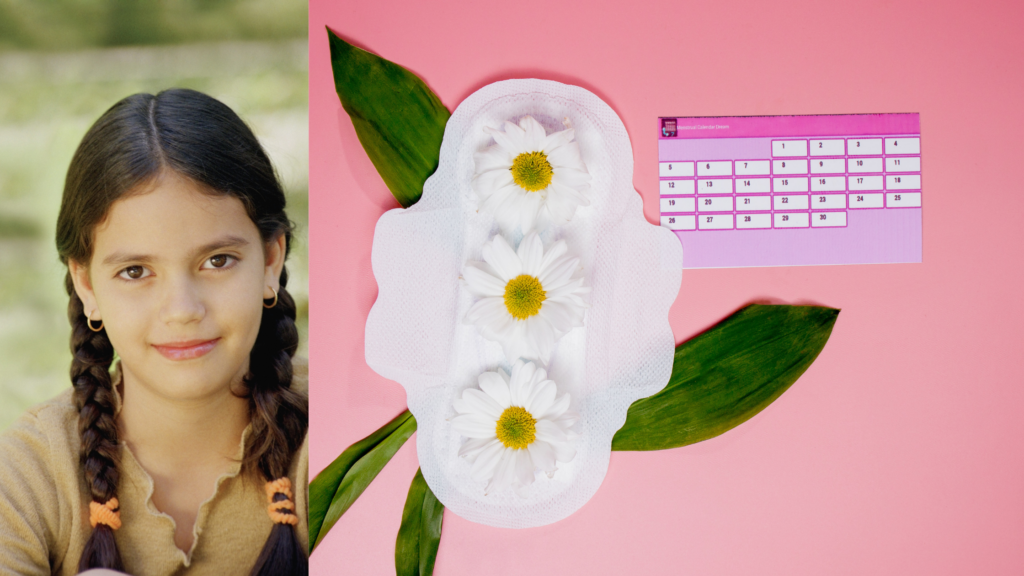WHAT TO EXPECT IN THE FIRST MENSTRUAL PERIOD

For most girls, the first period occurs approximately two years following the onset of puberty. The growth of breasts, body hair growth and body form changes are all signs of puberty.
Understanding the symptoms of the first menstruation might assist young females or ladies, and their parents or caregivers feel prepared.
Around 98 percent of females start menstruating by 15; however, the average age has fallen over time.
This article will discuss some of the indicators that a female can expect before her period comes and what it may feel like and step to take when it does.
Early signals of the start of a period
The most accurate approach to determine whether or not a female is about to have her first period is to determine whether or not she has entered puberty.
Puberty symptoms include the following:
• The development of pubic hair manifests itself in thicker hair on the legs and visible hair beneath the arms.
• Acne on the face or body
• Breast development
• Changes in body form, such as the thickening of the hips and thighs
• Rapid expansion
Typically, the first period begins a few years after the first signs of puberty occur. However, there is no way to foretell precisely when it will begin.
Some girls may experience spotting in their undergarments or abdominal cramps many days before their first period. Also, some individuals may report an increase in acne. This, however, will not be the case for everyone.
How did it begin?
Periods normally begin once a female ovulates for the first time. When the ovaries bring or release an egg into the fallopian tube, this happens.
When this occurs or happens, the uterine lining thickens in preparation for the fertilization of the egg. Without fertilization, the lining sheds, as the body no longer requires it. This is the source of menstrual blood.
This cycle frequently occurs in most females from the first period until menopause, periods cease.
How will it be?
Each female has a unique menstrual cycle. Periods vary in length, frequency, and degree of heaviness. Certain females have extremely mild menstrual cycles, whereas others have quite heavy menstrual cycles.
For some, the first period is brief, with little blood. It may develop gradually, beginning with spotting or dark discharge and progressing to redness.
For some, periods begin abruptly, with bright red blood immediately appearing. This is normal in either circumstance. The hue of period blood can range from brown to dark red. Also, some individuals may pass tiny blood clots.
Periods can feel comparable to vaginal discharge, although other ladies have no discomfort at all.
What to do if it begins
When your period begins, attempt to absorb the blood. A female can accomplish or make this by requesting a pad or tampon from a friend or family member.
If you cannot use a pad or tampon, consider wrapping something absorbent around the crotch area of some underwear, such as toilet paper or a clean washcloth. This is capable of absorbing blood and preventing leaks.
It may be beneficial to prepare a period kit before the onset of the first period. This can assist in feeling prepared. This vintage kit could include the following:
• An additional pair of underpants
• A selection of tampons and pads to select the one that is most comfortable for her.
• To clean any leakages, use unscented baby wipes.
Most menstrual cycles last between three and seven days. However, because the initial phase is less predictable, it may be slightly shorter or longer.
How frequently will periods occur?
Periods may be irregular throughout the first few years following a female’s first period, occurring at unpredictable intervals. They often become more regular overtime, however.
The average female has a period approximately every 28 days, though the duration varies from person to person and period to period. In any given year, the cycle length can vary by up to a week.
Summary
The first period of a female is a significant milestone. Waiting for it might be frightening, exhilarating, or a combination of the two. Periods are unpredictable, and they impact females differently.
Once a period begins, it may take time to develop the skills necessary to handle it. Consult a trusted adult, doctor, or nurse to obtain information and advice.
